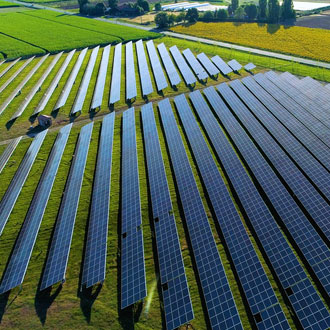Harvesting the financial benefit of renewables
The NFU (National Farmers' Union) recently announced plans to make British agriculture carbon neutral within two decades and with farming responsible for around a tenth of UK greenhouse gas emissions, this will be a vital step on the road to reaching net zero.
Alongside switching to more environmentally friendly working practices and enhancing land and buildings in ways that will help lower emissions, diversifying into renewable technologies presents a natural next step.
But what are the financial opportunities for farmers, when it comes to switching to renewables and low carbon technologies?
Solar and battery storage
It is a challenging time for many farmers right now and diversification is something many are keen to explore – especially when it comes to options that can provide a guaranteed, long term income.
Developing a solar farm, or hybrid solar and battery storage site, on suitable land or rooftops can provide many financial advantages for landowners and is a tried-and-tested route to both additional revenue streams and energy savings.
The fact solar panels can be installed on the ground or onto rooftops, are silent to run, require little maintenance and that the land can continue to be  used for grazing sheep and other small livestock, makes them very appealing. But that’s not the only benefit.
used for grazing sheep and other small livestock, makes them very appealing. But that’s not the only benefit.
1. Guaranteed income streams
There are many options for farmers when it comes to installing such technologies. One popular route is to lease the land to a developer for a guaranteed long-term income - with Anesco offering competitive rental payments, which are also RPI linked. Alternatively, landowners may choose to either fully fund or part own their project, to maximise the financial returns received.
2. Energy savings
Another key benefit is the energy savings that can be achieved. Farm buildings used for dairy, cold storage, grain drying, and housing poultry are particularly suited to solar panels, as they typically have large roof spaces and a high demand for electricity. By using clean energy generated onsite, utility bills and emissions can both be reduced. The savings potential can be further enhanced using a battery storage unit, which can store and release energy at the most beneficial times, such as when energy tariffs are at their peak.
3. Tax planning
Entering into a joint venture or partnership with a renewables developer may also be of benefit when it comes to Inheritance Tax. Farmland is generally exempted from inheritance tax under Agricultural Property Relief (APR) or Business Property Relief (BPR). If an agreement is drafted appropriately and both parties are seen to participate in the risk, then BPR could potentially be available. To ensure any such projects are being entered into in the most beneficial way, we would always advise seeking the advice of an experienced accountant.
Free expert advice for landowners
Anesco has been working with farmers and landowners for almost a decade. We have a strong track record behind us, offering a complete turnkey solution, from development and installation through to long-term maintenance.
We are also proud to be best in class when it comes to biodiversity and community engagement. We not only create flourishing habitats on solar farms in accordance with planning rules but go far beyond that - maximising the positive impact they have for local wildlife and species that are most under threat, involving the local community in the process.
For more information visit www.anesco.co.uk
- Log in to post comments

